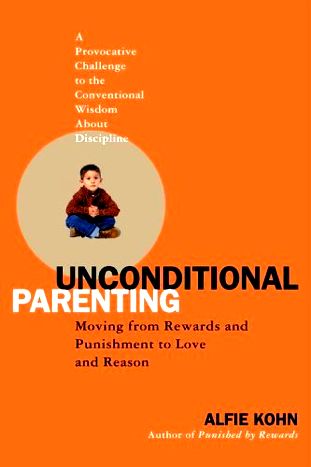 An acquaintance of mine started putting her daughter in time-outs at 9 months old. I never said anything, but I wondered (a) what could a 9 month old possibly do to earn a time out and (b) did this woman really think she was teaching her child anything useful by parking her in a pack n play for 2 minutes? I know many people swear by time-outs, but I've always felt vaguely uneasy with the concept. Taking a time-out from playing with peers is one thing, but isolating a young child from a parent especially when she is agitated and may not fully understand what she's done to upset that parent just seems cruel. So when a friend mentioned that Alfie Kohn's book, Unconditional Parenting: Moving from Rewards and Punishments to Love and Reason
An acquaintance of mine started putting her daughter in time-outs at 9 months old. I never said anything, but I wondered (a) what could a 9 month old possibly do to earn a time out and (b) did this woman really think she was teaching her child anything useful by parking her in a pack n play for 2 minutes? I know many people swear by time-outs, but I've always felt vaguely uneasy with the concept. Taking a time-out from playing with peers is one thing, but isolating a young child from a parent especially when she is agitated and may not fully understand what she's done to upset that parent just seems cruel. So when a friend mentioned that Alfie Kohn's book, Unconditional Parenting: Moving from Rewards and Punishments to Love and ReasonI really enjoyed the book. The first half catalogs how and why many popular discipline methods fail-- corporeal punishment, time-outs, reward charts and praise. Basically Kohn says that although such techniques may produce obedience in children, they do not help children to become kind, moral, confident or good problem solvers. Additionally such actions may end up eroding our relationships with our children. As he points out, "When you don't explain [why hitting is wrong] the default reason not to hit is that you'll be punished." And even if you do explain to your child why hitting is wrong in addition to punishing him, he is more likely to focus on the consequence to himself as opposed to how he may have hurt someone else. Praise and rewards for good behavior are essentially the other side of the same coin. Behaving well becomes all about self-interest instead of being a good citizen for the sake of others. The book is extensively footnoted and Kohn backs up most of his statements with research studies. Initially I thought his characterization of time-outs as "love withdrawal" was a bit extreme, but by the end of this section of the book he had convinced me that we should try to avoid these popular techniques, or at the very least not use them as our default form of discipline.
The second half of the book discusses what to do instead of time-outs, reward charts, etc. Kohn says we should listen to our children's explanations, give them reasons, give them choices, make compliance a game and, when necessary, exert parental authority with as much kindness and patience as possible. Here I would have really liked some more concrete examples. He did provide a few examples of how to deal with apologies, inappropriate TV shows and a really lovely anecdote about dealing with a child who was potentially going to clobber someone with a rock, but I still feel like more concrete examples would have been helpful. Of course the very nature of this type of discipline is that it is specific to the child and parent involved, so what may be effective and appropriate for one family may not work for another. For me, one of the most useful messages of the book is that we should remember our goals as parents center around teaching our children to be compassionate, thoughtful, confident people. I don't want my child to be the type of person who unquestioningly obeys the most powerful person around, whether that person is me as a parent, the queen bee in high school or an unethical boss at work.
But getting back to practical matters, I'm lucky that Baby M is a pretty good kid and I really don't have too many discipline problems. Other than some bedtime issues and food throwing we are in good shape. Luckily, I have a pretty high tolerance for mess and dog that eats everything. Seriously, how does anyone raise a toddler without a dog around to lick up the mess?
No comments:
Post a Comment